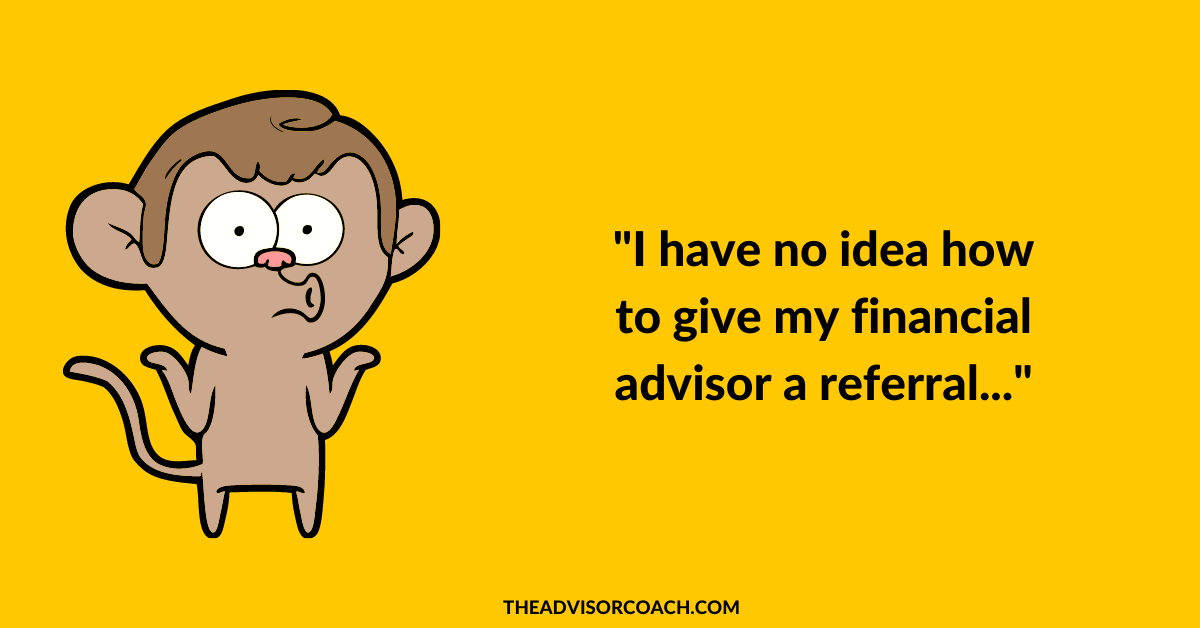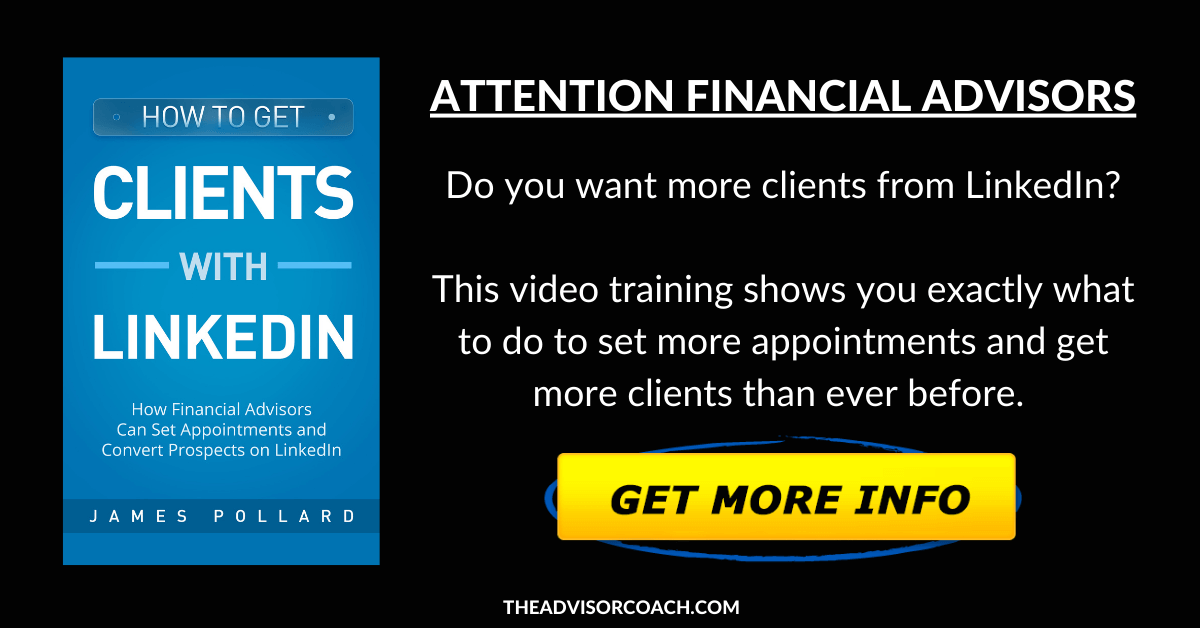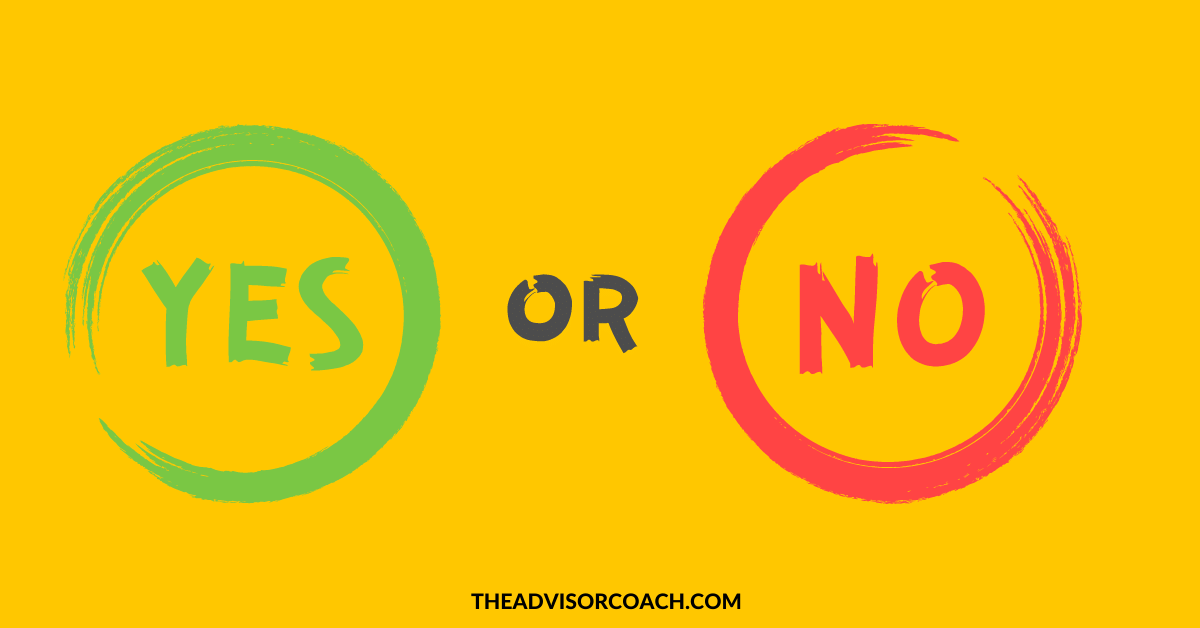7 Client Referral Ideas to Help You Get More ReferralsReferrals are a great way for financial advisors to get more clients, but consistently generating referrals can be tough.
With referrals, it’s easier to set appointments and have productive discussions because a higher level of trust and credibility is already established. Here are some stats on referrals:
Most professionals know that referrals are powerful, but they still struggle with tapping into their networks to generate referrals. Maybe they’re uncomfortable asking and don’t want to appear “sales-y”. Maybe they’re unsure if they’re actually delivering value and benefit to their clients. Whatever it is, most financial professionals could be doing better when it comes to getting referrals. Too many financial advisors rely on “accidental referrals” – this is not a good way to build a business. “Accidental referrals” are ones that are just naturally given to you. While they’re nice to have (and treated like gold by most of the industry), they are not yours by design. You did not choose to work with the people given to you. If you have a police officer client, he might give you a referral to a surgeon and a plumber. While he may think he’s doing you a big favor (and he might be, in the short-term), he’s actually doing you more harm than good in the long-term by scattering your focus across multiple types of people. If you try to please everybody, you end up pleasing nobody. It’s important to get clear on who you want to attract as clients and how your network can get you referrals to the people you truly want. When you choose a niche you will start to generate more targeted referrals, which helps you build your business by design. Here's what you'll learn in this article - feel free to use these links to jump ahead:
Now, let's start with some of my favorite referral ideas for financial advisors... 1. Start With Your Top Clients.It’s best to ask for referrals from your best clients. They are the ones who closely approximate your ideal client and are most likely to lead you to the type of prospect you want. That’s what I mean when I say building your business “by design”.
If you have clients who aren’t representative of your ideal client (and who doesn’t?) then still ask for referrals, but it might make more sense to refer them to another advisor that’s more suitable. In the long-run, that’s better than keeping someone who you don’t really want to work with and taking your focus off of your ideal clients. All that matters is that people are talking about you with their friends and family. Also, focus on the people who are most likely to give you the referrals you want. These are usually the clients that obviously love you and the ones that have already given referrals in the past. ALSO READ: 9 Elevator Speech Tips for Financial Advisors 2. Stop Being Vague.The biggest issue I see among financial advisors getting referrals is that they don’t ask. The next biggest issue I see is that when they do ask, they’re too vague.
Even when a client is truly responsive to a referral request, he/she may still draw a blank. That’s frustrating, but it’s the financial advisor’s fault. “Who do you know who could use my services?” is one of the worst offenders. It offers no insight into the type of person you want. Besides, your client probably doesn’t have an intimate view of his/her colleague’s finances. Don’t ever make your clients do the qualifying for you. That’s your job. All the client needs to do is have a clear picture of who you want as a referral, and it’s your job to help them get that clear picture. A lot of advisors think that if they get too specific with their request they’ll block off whatever referrals they would’ve gotten. This just isn’t true. More often than not, financial advisors don’t get referrals because they aren’t specific enough. If you don’t believe me, just try it. Pick anything – recently engaged, about to retire, a particular occupation, divorced, widowed, whatever. By putting your ideal client in focus, the client (who, remember, has the best of intentions) will be able to honestly tell you if he/she knows anyone. When you are clear and confident about your request, the better your client will receive the request. 3. Think About The Referrals You've Given.Think about the last time you’ve given a referral. Really think about it. Why did you give it? Did you give it with any hesitation? What caused you to have so much trust that you willingly gave a referral? How did the person ask for it, if at all?
When you can drill deep on your own thoughts and behavior, you get closer to understanding other people. I’ve heard all types of crazy referral strategies from financial advisors. Here are a few:
Ask yourself: have any of these happened to you? How did you respond? If they’ve never happened to you, how would you respond if they did? You’d probably respond in a negative manner. Why would you think your clients would feel differently? This isn’t rocket science. The big problem is that some clients just want to be nice or are pressured easily and give in to these tactics. This gives financial advisors the illusion that the referral strategies work. Wrong! The minute that the client leaves, he/she will call or text the referrals, saying “I’m sorry but I gave your name to this advisor, so just ignore him/her.” Financial advisors will stomp their feet and yell at me because I don’t like these slimy strategies. Do they work? Sure, but I could also mow my lawn with scissors. That “works” too. ALSO READ: A Day In The Life of a Financial Advisor 4. Remove the Risk.One reason why people are hesitant to provide referrals is because they’re afraid of looking bad. Who can blame them? They’re putting their reputation on the line and if you do a bad job, they look bad for recommending you.
Do the best you can with every client that comes across your table. Like most things in life that require hard work and patience, this pays big dividends. By handling your clients well and letting them know how you handle referrals, you remove a lot of the risk. Let them know that referred leads get VIP service from you and that you’re not going to hound them with phone calls or send them countless email blasts. Clients know that you want referrals – they’re not naïve – but they associate some level of risk with giving them to you. If you can remove the risk, you’ll be one step closer to bringing in new business. 5. Plant The Seed.Another important part of prospecting for referrals is simply to plant the seed. It plants the idea of giving you referrals into your client’s mind. When you do this, your future requests will be softer because it is expected. It will also elicit referrals from those who are ready and willing to giving referrals on the spot. You can plant referral seeds by:
6. Shift Your Referral Mindset.Most financial advisors and insurance agents have a producer mindset. While there’s nothing inherently wrong with this approach, there are more effective ways to get referrals. I personally suggest a client-centered approach. Understand that referrals are ways for your clients to help their friends rather than a way to help you.
You should also embrace referrals as a way to build your business. Stop thinking of them as something nice that happens every now and then and start thinking of them as part of your overall marketing plan. Plus, you might be working with some deeply rooted assumptions about referrals that just aren’t true. Some of the common assumptions are:
7. Give Them Permission To Say "No".You should always strive to go the extra mile and provide value for your clients. They aren’t stupid. They know you want referrals and they know that word-of-mouth is a powerful marketing tool for financial services professionals. The better your service, the easier it will be to get referrals because they will truly want to help their friends and family.
With that being said, you’re living in dreamland if you think every client will want to give referrals. Even if you’re the best financial advisor on the planet, some people just don’t want to do it. No big deal! If someone tells you that they don’t give referrals, it’s usually because of one (or both) of these two reasons:
If you want to explore their resistance, do so gently. I personally recommend that you respect their position and live to fight another day. If you plow ahead and try to get referrals from people who don’t feel comfortable giving them (for whatever reason, it’s none of your business), you run the risk of aggravating them. You don’t want to kill your client relationship for the chance of a referral. Please Stop Asking For Referrals This Way...One of the most popular episodes of my “Financial Advisor Marketing” podcast is titled, “Financial Advisors, Please Stop Asking For Referrals This Way.”
You can listen to the episode by using the player below, but here’s some of what I shared with listeners about the wrong way to ask for referrals: 💡 Referrals should be a side effect of doing good business; not the core of your business. [8:30] 💡 Never “brainstorm” referrals with your current clients. [8:40] 💡 Which words you must hear from your client before asking for a referral — and how asking too soon causes your clients to run and choose your competitors. [10:40] 💡 Why not to ask your clients for referrals during your regular financial planning meetings. [13:30] Not ready to listen? Check out these key points...
Stay Out Of LinkedIn DMsI love LinkedIn — it’s one of the best business-building tools financial advisors can use. It’s also super tempting to use your network to mine for referrals, but here’s a word of warning: don’t.
Although it seems like a no-brainer of a strategy, never ask for cold referrals through social media. Just because someone connects with you doesn’t mean you’re entitled to their world and personal connections. Plus, if you don't know a prospect well enough to have a real conversation over the phone or in person, there’s no way you’re friendly enough with them to ask for a referral. No if’s, and’s or but’s. Lose The Poor TimingToo many advisors do this: during regular financial or retirement planning meetings, you demonstrate your value through the typical motions, then you pop the big referral question.
Wash, rinse, repeat. If you’re wondering why that’s wrong, it’s because this is a stiff and robotic transfer. Even if you have a clear niche, asking for referrals at the wrong time puts your clients in an awkward position, because they’re not prepared. Besides, they won’t be able to conjure up the answers you’re looking for in the few seconds you give them to answer what they might feel is a loaded question. What you want to do is facilitate referrals rather than ask for them. Ideally, you’ll get to a place where your clients expect to give you referrals — and when they can expect it, they’ll always be able to recommend people who fit your ideal customer profile. Is it possible to hit the sweet spot where you get more referrals because your clients expect to give them to you? Keep reading to find out how to train your clients to exhibit certain behaviors. Never Be Pushy And AggressiveReferral gurus, unicorns, wizards — whatever you call these faux experts — spew tons of aggressive and outdated sales tactics about how to get a referral. These are the top three lines they use:
👎 “I get paid in two ways.” This insinuates advisors can get paid for doing work for the client and through the fees clients pay to send referrals. Sounds fishy, doesn’t it? After all, do clients get a fee discount when they refer someone? Steer clear of this tactic. 👎 “I need your help to grow my business.” Here’s the cold, hard truth: No one cares, and that’s why this line doesn’t work. Clients don’t hire you so they can help you build your business, so don’t assume they owe you referrals or that your services entitle you to their Rolodex. 👎 “I'd like you to write three names of people you think I can help; we can brainstorm together.” Oof. Talk about terrible advice. Once you get three names, you get three more names from them, three names from their people, and so on. Voila! Just like that, you have a book of business. (False.) If these strategies worked, wouldn’t everyone do it? Heck, I wouldn’t have written this article! This is the bottom line: you shouldn’t have to twist someone's arm to get a referral. In fact, try to think of them as a sweet bonus for being good at your job — if your clients refer business to you, great. But it shouldn't be the main objective. And you definitely shouldn't come across like... that. If these cheesy lines make you cringe, you’re on the right track. To succeed with today’s modern clients, your approach has to be more creative, so stay away from failing strategies that’ll turn prospects away. BONUS: 6 Reasons Why You're Not Getting Referrals...Are you getting enough qualified referrals from people within your network? Or are you relationship rich but referral poor?
In my experience working with those in the financial services industry, I’ve seen those who stay in touch with clients, go to networking events, and even ask for referrals, but never get much to show for it. Here are a few of the reasons why you don’t get more referrals. 1. You Don't Take The First StepBefore you ask for a referral, you must make sure that your client is happy with your services. If you ask too soon, you either won’t get referrals at all or the referrals will be poor quality.
Take a minute to talk to your client and ask, “How are we doing?” That little question works wonders. If you get a positive answer, you can move ahead and ask for referrals. If you get a not-so-good answer, you now have the opportunity to make it better and you’ll live to fight another day. Keep in mind success as a financial advisor is all about building and maintaining a relationship. Like romantic ones, when you jump the hurdle — in this case asking for a referral — too soon, it’ll be quick and easy to damage the partnership. You can gauge “too soon” in two ways:
Your client will show when they’re ready to give you a referral, so keep your eyes peeled. 2. They Don't Care Enough... YetThis goes hand-in-hand with #1. A lot of professionals will attempt to ask for a referral when the relationship is too new. There is a time and a place for everything, but if you’re attempting to build a long-term relationship with a client, it’s okay to take it slow.
Think about that time you found yourself in a networking situation and somebody you just met wanted to ram a business card in your hand. When they talk, it’s “me, me, me” and what you can do for them. That’s how you come across when you ask for a referral too early in the game. When someone gives you a referral, they are putting their reputation on the line. You want to be sure that your relationship with the person is developed enough to minimize the perceived risk they take on when referring you. Another reason they don’t care enough is that prospects and clients are busy. I publish a lot of material on dealing with rejection because a lot of people get hurt when the first try doesn’t go well and they shut down. Don’t do this – your clients are probably too wrapped up in their own world. They’re not even thinking about you or what you can do for other people they know. Take it slow, consistently express your gratitude, and remind them of how you could help other people they know. Don’t get discouraged if they don’t hop up and give you twenty names the first time. 3. You're Asking The Wrong WayWhen most people ask for a referral, they do it like this: “Who do you know who needs XYZ?” Every time I hear advisors say that, I get one step closer to going crazy. There’s also this one: “Do you know anybody who could benefit from my services?” That’s the absolute worst.
This question forces your clients to make a judgment in an area they may or may not feel comfortable with. All you’re doing is making your client mentally organize everybody they know, which is too overwhelming. Even if the client is deep in thought and genuinely wants to help you, all they’ll be able to muster is a timid, “I can’t think of anybody.” Do some filtering when you ask for a referral: If you sell life insurance, go ahead and ask, “Do you know anyone who recently had a child or might start a family soon?” By asking more specific questions, you’ve whittled the 500 people your client knows all the way down to three or four. 4. You Aren't Giving ReferralsOne of the best ways to get referrals from other people is to give them first. When you give a referral, you demonstrate your utmost trust and confidence in the person. You also show your willingness to assist or help your client resolve a problem he/she has – the mark of a true professional.
It’s likely that at least some of your clients are lawyers, doctors, business owners, managers, or some other type of professional. You are the person who interacts with all of these people. If you know someone who needs a particular service, make a referral! Call your client and check up on them. If they have a problem that can be solved by someone in your network, let them know. Not only will you have stayed in front of your client, but you will kick in a primal urge to reciprocate on the part of the professional. Nearly all service professionals get part of their business from referrals, so send a few their way. 5. You Haven't Trained Your ClientsBack to this question: How can you get your clients in the mindset to expect to give you referrals? Share your joy.
Without sharing any personal information, tell your clients stories about how you make others happy. Share details about your business, like the retirement parties or client appreciation events you’ve thrown. Highlight your best case studies, or explain how pleased your other referrals are with your management style and how they’ve progressed. When you make it clear you build your business by spreading love to help more people within a niche, you set up your client’s expectations to follow the lay of your land. Financial advisors have to join the ranks of businesses that do the same with their clients — if you make referrals a natural step of doing business with you, clients won’t think twice to follow suit. 6. You Don't AskUnfortunately, this is the most common and most easily overlooked reason referrals aren’t coming your way. If you don’t ask, you don’t receive. “Oh, I didn’t know you needed more business!” will be heard so much you’ll think it’s your new ringtone.
Russ Alan Prince’s book, Cultivating The Middle-Class Millionaire tells us that 70% of loyal millionaires were likely to refer people to their primary advisor, yet only 10.7% of advisors actually asked clients for referrals. Dan Allison, the founder and president of Feedback Marketing Group, says that when most advisors lay out their method of asking for referrals, they’re not really asking anything. Sometimes clients don’t even know they’re being asked, or they don’t know that you’re taking on new clients. Be clear and direct. P.S. If you're a financial advisor who wants to get more clients from LinkedIn, make sure you check out How to Get Clients With LinkedIn: How Financial Advisors Can Set Appointments and Convert Prospects With LinkedIn |





